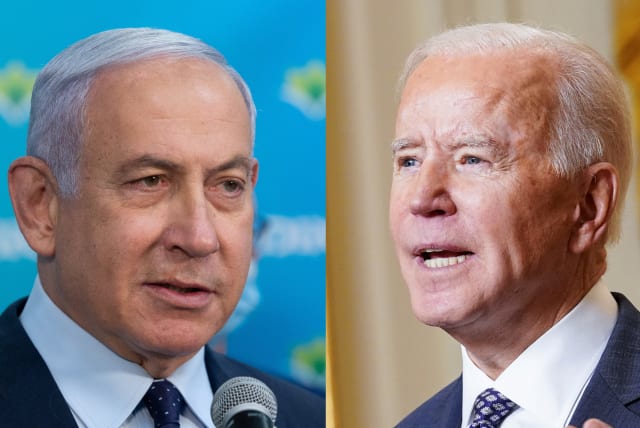Israel: US-Iran deal will not stop nuclear program, help fund terror

"[The deal] does not end Iran's nuclear program and will only help to fund Iranian terror proxies," Israel's PMO said on Saturday.
Israel warned against the danger of any United States deal with Iran that doesn’t halt the Islamic Republic’s nuclear program after Washington announced a six billion dollar deal with Tehran for the release of five imprisoned Americans.
The unusual agreement between Tehran and Washington comes amid Israeli fears that the Biden administration is seeking an understanding with Iran that would allow it to maintain much of its nuclear capacity.
“Israel's position is known,” the Prime Minister’s Office said. “Arrangements that do not dismantle Iran's nuclear infrastructure do not stop its nuclear program and only provide it with funds that will go to terrorist elements sponsored by Iran.”
Strategic Affairs Minister Ron Dermer is set to travel to Washington later this week to talk with the Biden administration about Iran and about the potential US-Saudi Arabia deal that would include normalization with Israel.
According to the Hebrew news site Walla, Dermer will fly out on August 17 for talks with US National Security Advisor Jake Sullivan, as well as Middle East envoy Brett McGurk and US Special Envoy for International Energy Affairs Amos Hochstein.
Lapid concerned by potential Iran deal
Opposition leader MK Yair Lapid (Yesh Atid) said last week he was concerned that the Biden administration deal with Riyadh would include US support for a civilian nuclear program that would allow for Saudi Arabia to enrich uranium.
In Washington, Biden administration officials portrayed the deal as a one-time event and not part of a larger understanding with Tehran. The US has publicly dismissed the possibility of a deal with Iran to halt its nuclear program in light of Tehran’s military cooperation with Russia against Ukraine.
On Friday, however, the Wall Street Journal reported that Iran has significantly slowed the pace at which it is accumulating near weapons-grade enriched uranium and has diluted some of its stockpile.
US National Security Council spokesperson John Kirby said he could not confirm the WSJ report but that "any steps that Iran might take to slow down enrichment certainly would be welcome."
"We're not in active negotiations about the nuclear program," he added. "But certainly those sorts of steps, if they were to be true, would be welcome."
The White House pushed back Friday at accusations that the six billion would be used to support terror, stressing that there would be restrictions on what Iran could do with the funds, which belonged to Tehran but had been held by South Korea.
Kirby told reporters that the US would have "full visibility" into where any released Iranian funds are directed and used.
"Essentially, the funds can only be accessed for food, medicine, medical equipment that would not have a dual military use," he said. "And there will be a rigorous process of due diligence and standards applied with input from the U.S. Treasury Department."
The five Americans will be allowed to leave Iran after the funds are unfrozen, a source familiar with the matter told Reuters.
While stressing that negotiations are ongoing and "the deal is not done," Kirby said there would be "no impediment" to the transfer of the restricted account from South Korea to Qatar, where Iran would then be able to access the funds.
Iran's central bank chief said on Saturday that all of Iran's frozen funds in South Korea had been unblocked and would be used for "non-sanctioned goods."
The potential transfer has drawn Republican criticism that President Joe Biden, a Democrat, is effectively paying a ransom for the U.S. citizens. Moreover, they contend that allowing Iran to use the money for humanitarian goods could free up funds for its nuclear program or to back militias in nations such as Iraq, Lebanon and Yemen.
U.S. Secretary of State Antony Blinken insisted on Thursday that the deal does not mean that Iran would be getting any sanctions relief.
As a first step in what may be a complex set of maneuvers likely to take weeks, Iran allowed four detained U.S. citizens to move into house arrest from Tehran's Evin prison on Thursday. A fifth was already under home confinement.
Under the deal, the United States would release some Iranians from U.S. prisons, Iran's mission to the United Nations said.
Lapid used the announcement of the deal as an opportunity to attack Netanyahu, explaining that the tensions between Jerusalem and Washington over the government’s judicial reform plan had harmed Israel's ability to advocate against the deal.
“This is part of the damage caused by the deterioration of relations between the US and the completely failed right-wing government,” Lapid tweeted.
‘Now the Americans have closed a deal with the Iranians that will pour billions of dollars into the Iranian nuclear program and no one listens to the Israeli position,” he said.
Jerusalem Post Store
`; document.getElementById("linkPremium").innerHTML = cont; var divWithLink = document.getElementById("premium-link"); if (divWithLink !== null && divWithLink !== 'undefined') { divWithLink.style.border = "solid 1px #cb0f3e"; divWithLink.style.textAlign = "center"; divWithLink.style.marginBottom = "15px"; divWithLink.style.marginTop = "15px"; divWithLink.style.width = "100%"; divWithLink.style.backgroundColor = "#122952"; divWithLink.style.color = "#ffffff"; divWithLink.style.lineHeight = "1.5"; } } (function (v, i) { });

